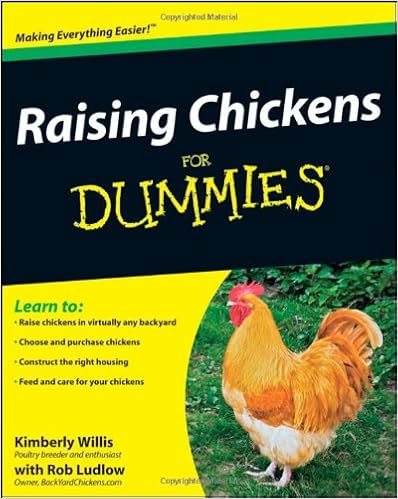So I'm on the path to chicken-hood. How do I get there? Where do I start? Well, I started with making sure Bobby didn't think I was going crazy (he may think that, but God bless the man - he says he's on board) and getting some essential reading material:
After skimming a few chapters of the above I presented myself with the following questions:
Is it Legal?
Before I got too carried away with daydreams of fresh eggs I had to figure out whether it was legal or not to have chickens in my area. Fortunately, laws were passed in favor of backyard chickens a few years ago here in Nashville and the current regulations are pretty simple: no roosters, up to 6 hens allowed (based on yard size), no free-ranging, and pay an annual fee. Easy peasy. A quick post on NextDoor also revealed that several neighbors were already tending backyard flocks in my area - yay!
How Many Hens?
Based on our yard size I could have the maximum of 6 hens if I'd like. Considering I'm a bonehead going into this with zero experience, I figured I'd start small. Three seemed like a reasonable number, however a lady on my new favorite website kindly pointed out that even numbers work better with hens due to their pecking order. She also suggested getting at least two of each type of hen I want so that one doesn't get left out or bullied (hens seems to have a lot in common with middle school girls). Based on her advise, I am now planning on four hens but creating enough space for six in case I go crazy.
What Kind of Hens?
There are a LOT of different chicken breeds out there and the kind you choose basically depends on what your end goal is: eggs, meat, eggs AND meat, breeding, showing, or pets. I'm really only in it for the eggs, but hadn't considered the factor of personality until reading this blog post recently. I think I'm leaning towards 2 Plymouth Rocks and 2 Australorps, but we'll see what I'm thinking come Spring!
I had read in a lot of places that it is more economical to raise hens from chicks vs buying pullets (i.e. young hens). While this may be true (chicks usually go for around $5 per bird and pullets $15-25 depending on the breed) I've found a lot of reasons to go for pullets over chicks in my situation.
- Chicks require a lot of care and expenses - you raise them indoors in a brooder with specific temperature (start at 95 degrees and lower by 5 degrees weekly - like I'd remember to do that) and feeding requirements prior to moving them outside to a coop and run. You have to check on them frequently make sure they don't die from stupidity (I've read you have to teach them how to drink by dipping their beaks in water, but then you have to make sure they don't drown in said-water - cute).
- While a $5 chick is cheaper than a $15 pullet, you're really only saving loads if you're purchasing a huge flock. For my backyard flock of four, $60 vs $20 isn't going to break the bank.
- Hens don't start laying eggs until they reach 18-20 weeks of age - that's close to 5 months of care before you get any pay-off. Pullets should be at or near egg-laying age by the time you purchase them.
- Chicks are difficult to sex. Birds keep their junk in their trunk, so you could easily raise 6-8 chicks thinking you'll end up with a thriving neighborhood egg business only to discover that 7 of them are roosters in the end (news flash: roosters don't lay eggs). This isn't such a big deal if you live on a farm or want to breed the birds, but if 4 out of my 4 chicks turn out to be roosters I am back at square one and in desperate need of someone to take 4 roosters off my hands!
Build or Buy?
So I need both a coop and a run. A lot of folks can get away with just a coop if they live on a farm or in a community that allows free range birds. I, however, live on a busy street (in the last two years of home ownership we have seen at least two cars end up in neighbors front yards due to accidents) without a fully fenced in yard with neighbors that make losing their pets look like a profession (every time I'm on NextDoor there are at least 4 cats and 3 dogs declared missing).
So I need a sturdy coop and run.
A quick Google search opened my eyes to the sham that is overpriced chicken coops. It seems you have to dump at least $500 for something that doesn't resemble a Fisher Price doll house. I saw a few for around $150-200, but they looked pretty shoddy. A quick cry for help on my new favorite website confirmed my suspicions: the cheap prefabricated chicken coops are as shoddy as they look.
So I have decided to build my own. I'm determined to try and build a decent coop and run for the cost of a cheap prefab. So far my obsessive scouring of Facebook Marketplace, Craigslist, and Nextdoor has payed off. I'm hoping to start building after Christmas. Stay tuned for that, it should be hilarious.
Is it Worth It?
I'm definitely not going to be "saving money" by raising chickens for eggs. Organic pasture raised eggs are expensive, but raising chickens will likely cost more than my monthly egg budget. But cost isn't my main motivator. I'm excited to have chickens for a lot of reasons.
- I love birds and I love my backyard, so having domesticated bird pets in my backyard that plop out food every so often seems like a win-win.
- Home layed eggs give me a chance to be a little less reliant on our fuel-guzzling fake food economy.
- Chickens could be an awesome addition to my little backyard ecosystem. I've already decreased our household waste a lot by recycling and composting, but chickens could take it to the next level! Shredded cardboard and paper can be used in place of straw for coop bedding. They eat table scraps that are non compostable (i.e. meat, dairy, bread, and cooked foods). Chicken poop is an incredibly rich addition to any garden soil - so all that shredded paper goes straight into the compost on cleaning day and feeds my veggies once it's all decomposed! Also, did you know that eggshells are incredibly good for your garden?
But seriously, I get stoked when I think about my paper and table scraps ending up in my garden all thanks to the power of chickens. That alone would be reason enough as a gardener to keep them around. Add eggs into the mix and it's a win all around!

































